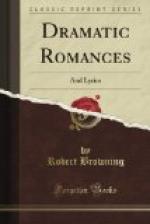The story told by the huntsman in “The Flight of the Duchess” is interesting enough simply as a story, but the telling of it is inimitable. One can see before him the devoted, kindly man, somewhat clumsy of speech, as indicated by the rough rhymes, and characteristically drawing his illustrations from the calling he follows. Keen in his critical observation of the Duke and other members of the household, he, nevertheless, has a tender appreciation of the difficulties of the young Duchess in this unloving artificial environment.
When the Gypsy Queen sings her song through his memory of it, the rhymes and rhythm take on a befitting harmoniousness and smoothness contrasting finely with the remainder of the poem.
By means of this song, moreover, the horizon is enlarged beyond the immediate ken of the huntsman. The race-instinct, which has so strong a hold upon the Gypsies, is exalted into a wondrous sort of love which carries everything before it. This loving reality is also set over against the unloving artificiality of the first part of the poem. The temptation is too strong for the love-starved little Duchess, and even the huntsman and Jacinth come under her hypnotic spell.
Very different in effect is “Childe Roland to the Dark Tower Came.” The one, rich in this lay of human emotion, couched in the simple language of reality; the other, a symbolic picture of the struggle and aspiration of the soul. Interpreters have tried to pin this latter poem down to the limits of an allegory, and find a specific meaning for every phrase and picture, but it has too much the quality of the modern symbolistic writing to admit of any treatment so prosaic. In this respect it resembles music. Each mind will draw from it an interpretation suited to its own attitude and experiences. Reduced to the simplest possible lines of interpretation, it symbolizes the inevitable fate which drives a truth-seeking soul to see the falsity of ideals once thought absolute, yet in the face of the ruin of those ideals courage toward the continuance of aspiration is never for a moment lost.
As a bit of art, it is strikingly imaginative, and suggests the picture-quality of the tapestried horse, which Browning himself says was the chief inspiration of the poem. It is a fine example of the way in which the “strange and winged” fancy of the poet may take its flight from so simple an object as this tapestried horse, evidently a sorry beast too, in its needled presentment, or the poetic impulse would not have expressed itself in the vindictive, “I never saw a horse [sic] I hated so.”]
INCIDENT OF THE FRENCH CAMP
I
You know, we French stormed Ratisbon:
A
mile or so away,
On a little mound, Napoleon
Stood
on our storming-day;
With neck out-thrust, you fancy how,
Legs
wide, arms locked behind,
As if to balance the prone brow
Oppressive
with its mind.




